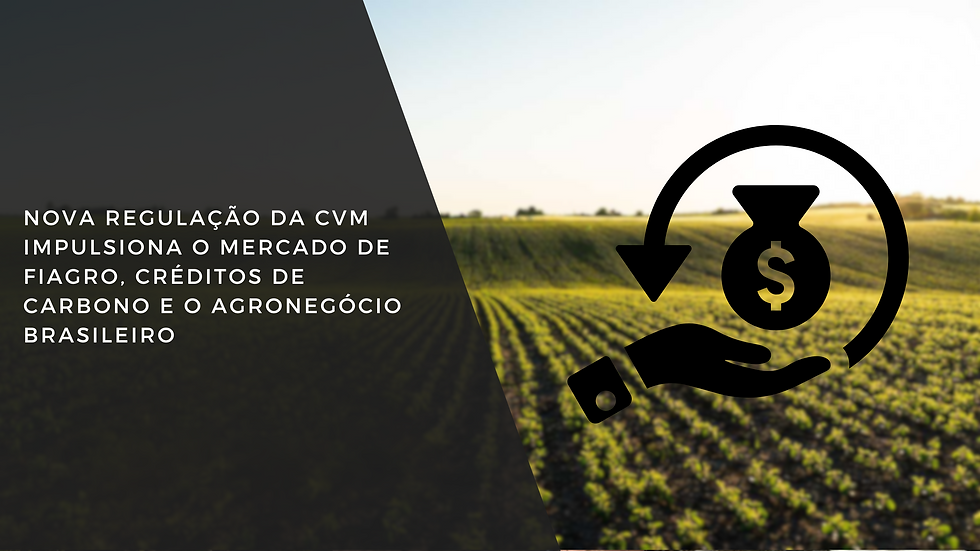New CVM Regulation Boosts the Fiagro Market, Carbon Credits and Brazilian Agribusiness
- Piva Advogados

- Oct 18, 2024
- 3 min read
In force since the end of last year, CVM Resolution 175/22 has been changing the investment fund sector, introducing new rules that have a profound impact on the market. Existing funds (stock) will have until June 30, 2025 to adapt to the new rules.
One of the most relevant innovations for the current market is the inclusion of carbon credits among the assets that can make up the portfolio of Investment Funds in Agribusiness Production Chains (FIAGRO). This innovation creates a direct bridge between Brazilian agribusiness and the growing sustainability market, attracting investments focused on the ESG (Environmental, Social, and Governance) agenda and opening up new opportunities for the sector.
The new rule replaces the transitional regulation (CVM Resolution 39) that limited the activities of FIAGRÓs, restricting the scope of investments and the composition of portfolios. Now, Fiagros can combine different types of assets from the agro-industrial production chain, such as rural properties, credit rights and equity interests. This gives managers more freedom to diversify their portfolios and seek higher returns.
Another advancement of CVM Resolution 175/22 for the sector is the expansion of the concept of rural property, allowing investments in properties located in urban areas, as long as they are linked to agro-industrial activities. In addition, Fiagros can now invest in real rights over properties and in real estate credits linked to agribusiness, which offers more flexibility for leverage and guarantee operations.
These changes not only bring more freedom to fund managers, but also greater attractiveness for investors interested in combining financial returns and positive environmental impact.
The Role of Carbon Credits in Fiagro
With the new regulation, Fiagro can now invest in carbon credits generated by emissions reduction projects within the agro-industrial chain, in addition to CBIOs (Decarbonization Credits), created within the scope of RenovaBio. This means that the agricultural sector, in addition to its traditional sources of income, can benefit financially from sustainable practices that contribute to the reduction of greenhouse gases.
These carbon credits represent financial compensation for each ton of CO₂ that is not emitted or that is removed from the atmosphere through sustainable practices, such as reforestation, regenerative agriculture and conservation of native forests. By integrating these assets into the Fiagro portfolio, investors can actively participate in a growing market, while contributing to the sustainability of agribusiness.
Positive Impact on Sustainable Agribusiness
The inclusion of carbon credits in Fiagro also strengthens Brazil's position as a leader in sustainable agribusiness. Agricultural production, often criticized for its environmental impact, has the opportunity to demonstrate its contribution to climate change mitigation by encouraging a promising sector that implements more sustainable and responsible agricultural production, in addition to implementing technologies aimed at implementing carbon credit projects.
In addition, this new investment avenue helps attract foreign capital, as many global investors are increasingly focused on sustainable projects and funds that follow ESG principles. Regulation allows Brazilian agribusiness to align itself with these international market demands, increasing its competitiveness and its ability to generate long-term value.
Advantages for Investors
For investors, diversifying Fiagro portfolios with carbon credits offers a new form of return, linked not only to agricultural productivity, but also to the environmental performance of companies in the agro-industrial chain. This makes Fiagro a more attractive vehicle, especially for those interested in combining financial returns and positive environmental impact.
Furthermore, the growth of the carbon market, driven by global and national policies to combat climate change, tends to increase the value of these credits over time, offering significant appreciation potential for Fiagros that invest in this area.
The new regulation is part of a larger set of adjustments promoted by the CVM, encompassed by CVM Resolution 175, which covers the entire investment fund industry. This measure reinforces the position of Fiagros as an important financing mechanism for agribusiness, benefiting both investors and the sustainable development of the sector.
With CVM Resolution 214, Fiagros are consolidating themselves as a strategic tool for the Brazilian economy, promoting innovation in agribusiness and attracting more capital to a vital sector for the country.
Investing in carbon credits has never been so promising. Our team at Piva Advogados is ready to help you.










コメント